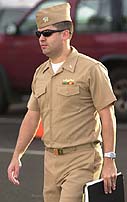By Dan Nakaso
Advertiser Staff Writer
The officer of the deck of the USS Greeneville at the time of a fatal collision was probably the most methodical junior officer aboard the submarine, which was both his strength and his weakness, according to testimony this morning from the Navy admiral who investigated the crash.
 |
Lt. j.g. Michael Coen, one of the Greeneville officers who are the subjects of the Navy's court of inquiry,arrives today at the Pearl Harbor trial services center.
Richard Ambo • The Honolulu Advertiser |
Lt. j.g. Michael Coen, one of three Greeneville officers at the center of the Navy’s court of inquiry into the collision with the Ehime Maru fishing ship, is “a very deliberate watch stander, of all of the junior officers in the ward room, perhaps the most deliberate,” said Rear Adm. Charles H. Griffiths Jr.
Griffiths considered Coen’s reputation aboard the Greeneville as both “criticism and praise,” he said.
“If they need to do things in a hurry, he’s probably the worst junior officer to get you there, because he is so deliberate,” Griffiths said. “... But he never ever skips the steps.... He can be relied on to be meticulous.”
Day 4 of the court of inquiry into the Feb. 9 fatal crash continued this morning with Griffiths being cross-examined by Coen’s attorney, Lt. Cmdr. Brent Filbert.
Coen qualified to be an officer of the deck in June, Griffiths said. The sub’s captain, Cmdr. Scott Waddle, had said that Coen “needed careful watching because he was inexperienced — something to that order,” Griffiths said.
After soliciting Griffiths comments about Coen’s reputation for being deliberate, Filbert walked him through the events in the Greeneville’s control room on Feb. 9.
The Greeneville was on a day trip designed to show 16 civilians how fast-attack submarines operate, and was running 45 minutes behind schedule.
Waddle told Coen he wanted to rise to periscope depth within five minutes, quicker than usual, Griffiths had testified previously.
“I think a commanding officer telling (that to) a young officer of the deck would influence how a young officer of the deck executes his duties,” Griffiths said. “I would think he would have to operate with a great deal of alacrity, maybe more than he’s used to.”
Waddle was preparing the Greeneville for a critical scan for surface ships just before dropping down, then shooting back to the surface in a dramatic “emergency blow.”
With Coen looking through the Greeneville’s No. 2 periscope, he was dependent upon the fire control technician to alert him to a sonar contact that later turned out to be the Ehime Maru, Griffiths said.
But in a control room crowded with visitors, the fire control technician failed to tell anyone about the sonar contact 2,000 yards away, which was identified at the time only as Sierra 13.
“At the very least, the FT (fire control technician) of the watch should have spoken up and said that ... ‘I have an indication that Sierra 13 is much closer than previously thought and a potential closure and threat out there,’ ” Griffiths said.
Even after Waddle gave the orders to descend and begin the emergency blow procedures, Filbert asked Griffiths whether the technician could have made a difference by notifying the officer of the deck or the captain.
“Most emphatically yes,” Griffiths said. “That was a key piece of information.”
As the Greeneville blew its ballast tanks and rocketed toward the surface, the fire control technician still could have mentioned the presence of Sierra 13, Griffiths said.
But it would have been a struggle to alter the course of the Greeneville using the sub’s engines, he said.
The effort, Griffiths said, would have been “a test of wills, if you will, between extreme buoyancy and propulsion to make a difference.”
After Filbert’s cross-examination, court member Rear Adm. David Stone turned Griffiths’ attention back to the responsibilities of ship commanders.
Reading from remarks on a yellow legal pad, Stone said: Commanding a U.S. warship “is a very unique and special responsibility.... People’s lives are often dependent on (the captain’s) decisions being correct.”
Just becase a captain exercises his best judgment, Stone said, does not mean that the actions are “safe ... satisfactory or correct.”
Griffiths responded: “I’ve laid awake for a month now at night thinking about this issue, thinking about Cmdr. Waddle, who is no doubt doing the same thing.... He had a bad day where some mistakes were made.”

